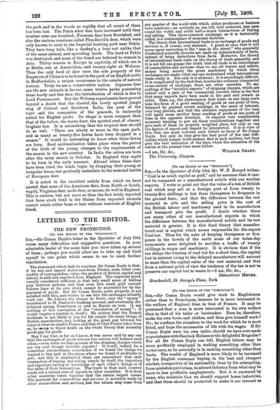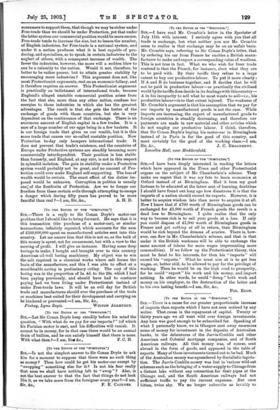[To THE EDITOR OF THE "SPECTATOR."] SIR,—Sir Conan Doyle would
give work to Englishmen rather than to Frenchmen, because he is more interested in the welfare of England than in that of France. It may be presumed that a man is more interested in his own welfare than in that of his tailor or bootmaker. Does he, therefore, make his own boots and clothes, and thus give himself work ? No ; he confines his attention to the work for which he is most fitted, and buys the necessaries of life with his wages. If Sir Conan Doyle were his own tailor, should we have ever made acquaintance with Sherlock Holmes or the delightful Brigadier? For all Sir Conan Doyle can tell, English labour may be more profitably employed in making something other than motor-cars, as he assuredly is in making something other than boots. The wealth of England is more likely to be increased by the English consumer buying in the best and cheapest market, irrespective of its nationality, than by his attempting, from mistaken patriotism, to attract industry from what may be more to less profitable employments. • But it is answered by some, who maintain that we should support home industries, and that these should be protected to make it our interest as consumers to support them, that though we may be richer under Free-trade than we should be under Protection, yet that under the ratter system our commercial position would be more secure. Free-trade tends to increase the size, but to lessen the number, of English industries, for Free-trade is a national system, and under it a nation produces what it is best capable of pro- ducing, and specialises, so to speak, in certain industries to the neglect of others, with a consequent increase of wealth. The fewer the industries, however, the more will a sudden blow to one be a calamity to the nation. Would it not, therefore, be better to be rather poorer, but to attain greater stability by encouraging more industries P This argument does not, like most Protectionist arguments, rest on an economic fallacy, and it therefore requires an answer. This Protectionist argument is practically an 'indictment of international trade, because England's alleged unstable commercial position arises from the fact that she, more than any other nation, confines her energies to those industries in which she has the greatest advantages. The result is that she gets the better of the exchange of goods with those countries, but she is very dependent on the continuance of that exchange. There is an enormous amount of English capital in a few trades. It is a ease of a large number of our eggs being in a few baskets. It is our foreign trade that gives us our wealth, but it is this same trade that causes our so-called unstable position. Now Protection to-day only hampers international trade. It does not prevent that trade's existence, and the countries of Europe under Protective systems are steadily becoming more commercially interdependent. Their position is less stable than formerly, and England, at any rate, is not in this respect in splendid isolation. The gain in stability under a Protective system would probably not be great, and no amount of Pro- tection could ever make England self-supporting. The loss of wealth would be certain. The exact effect of the duties im- posed would be unknown. Corruption in politics is usually one of the firstfruits of Protection. Are we to forego our freedom from these certain evils through attempting to escape a danger which during fifty years has proved to be more fanciful than real P-1 am, Sir, &c., A. H. D.







































 Previous page
Previous page